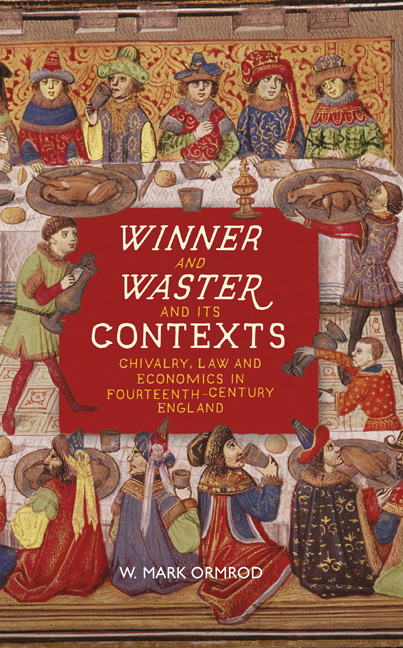Book contents
- Frontmatter
- Contents
- Acknowledgements
- Note on Editions
- List of Abbreviations
- Introduction: Winner and Waster: A Poem on the Times
- 1 Chivalry and Internationalism: The Garter Feast of 1358 and English Diplomacy during the 1350s and 1360s
- 2 Treason, Public Order and Dispute Settlement: The Statute of Treasons of 1352 and Royal Arbitration
- 3 Landed Society, Conspicuous Consumption and the Political Economy: The Sumptuary Laws of 1363
- 4 The Private and the Public Spheres: The Royal Household and State Finance under Edward III
- 5 Satire, Complaint and Authorship: Winner and Waster and the Alliterative Revival of the Fourteenth Century
- 6 Winner and Waster: Timeliness and Timelessness
- Appendix 1 Timeline, 1337–70
- Appendix 2 A Modern English Version of Winner and Waster
- Bibliography
- Index
- Publisher̕s Note
6 - Winner and Waster: Timeliness and Timelessness
Published online by Cambridge University Press: 09 April 2021
- Frontmatter
- Contents
- Acknowledgements
- Note on Editions
- List of Abbreviations
- Introduction: Winner and Waster: A Poem on the Times
- 1 Chivalry and Internationalism: The Garter Feast of 1358 and English Diplomacy during the 1350s and 1360s
- 2 Treason, Public Order and Dispute Settlement: The Statute of Treasons of 1352 and Royal Arbitration
- 3 Landed Society, Conspicuous Consumption and the Political Economy: The Sumptuary Laws of 1363
- 4 The Private and the Public Spheres: The Royal Household and State Finance under Edward III
- 5 Satire, Complaint and Authorship: Winner and Waster and the Alliterative Revival of the Fourteenth Century
- 6 Winner and Waster: Timeliness and Timelessness
- Appendix 1 Timeline, 1337–70
- Appendix 2 A Modern English Version of Winner and Waster
- Bibliography
- Index
- Publisher̕s Note
Summary
The underlying objective of this study has been to test, re-establish and extend the argument, first developed by Hulbert and later revived and extended by Lawton and Salter, that W&W is likely to have been written not in the early 1350s but at some point in the 1360s (or, as Salter would have it, still later). These arguments were based on close reading of some of the crucial ‘historical’ passages in the poem, which under closer scrutiny need not, as supposed by others, refer solely to a cluster of events and debates around the years 1352–3; in Salter's case, the dating relied on her explo¬ration of a heraldic motif linking the poem (as she argued) to the family circle of Sir John Wingfield, which opened up the possibility of a relatively remote composition date stretching into the 1380s and beyond. The present analysis has suggested some new frames of reference for the poem, arguing inter alia that an effective terminus a quo for the dating of the poem may now be set at the Garter feast of April 1358. As regards a terminus ante quem, this analysis agrees in principle with Trigg that the poem is unlikely to have been written much later than the death of Sir William Shareshull in 1370, not just because of the mention of the chief justice in the poem, but also because the whole political atmosphere of England changed so radically after the re-opening of the French war in 1369, culminating in the general state of outrage about a broken and corrupt regime expressed in the Good Parliament of 1376.
In particular, this study has demonstrated the significant number and range of possible referents within the poem to events and debates of the 1360s: the attitude of political society towards the Anglo-French diplomatic settlement of 1360; the controversies provoked by the making and unmak¬ing of the new sumptuary laws in 1363 and 1365; the manner of funding the king's peacetime regime as determined in the parliaments of 1362, 1365 and 1368; and the scandalous dismissal of the king's steward, Sir John atte Lee, in 1368.
- Type
- Chapter
- Information
- Winner and Waster and its ContextsChivalry, Law and Economics in Fourteenth-Century England, pp. 131 - 136Publisher: Boydell & BrewerPrint publication year: 2021

